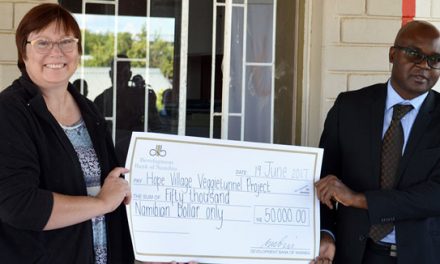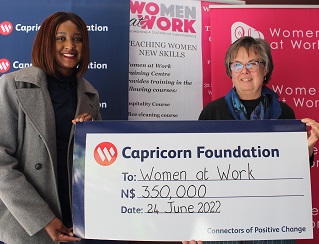
Restoring dignity when none is left – Dignity project helps survivors of child rape

Surviving rape is a gruesome ordeal. Surviving the forensic and law enforcement process that follows, can be just as damaging to the victim, especially if it is a child.
Helping under-aged rape victims to maintain some dignity is the Dignity project that puts together Dignity Kits for the Social Workers in the Gender Violence Protection Unit of the Ministry of Health and Social Services.
This week the Dignity project delivered another batch of Dignity Kits, sponsored by the Imperial Group of Companies.
Senior Social Worker in the Gender Violence Protection Unit, Ms Clemenciah Kavita, said “We are truly grateful for the support provided to the survivors by the Dignity project. These kits leave our office with dignity as they bring hope and healing to our survivors.”
“By providing the survivors with these Dignity kits we reiterate that you are not alone, we believe in you and you are safe now. It also helps the survivors to feel a little more connected after the trauma they have been through,” she added.
The Dignity project is run by the Sisters of the Windhoek Congregation of the Dutch Reformed Church in Africa (Hervormde Kerk), under the leadership of Sandra Loubser.
For the older generation, this church is known as the Badkamerkerk as the outside walls used to be covered in white tiles. The younger Windhoek generation knows it as the Biltongfeeskerk.
As project custodian, the church realised that child rape victims are at the mercy of the system without protection or guidance, in essence completely without dignity. From this concern, the project was born and has been running for many years.
When a rape case is reported to the police, a forensic process is put in motion. The evidence gathered in this way from the victim is crucial to charge the perpetrator and to ensure that justice is done through a conviction in a court of law.
But the investigation can be very unsettling and often escalates the trauma to which the victim is exposed. The Dignity kits provide every victim with a means to clean and cover the body, to help restore trust in other people through the support provided by social workers.
The kits are prepared with the age group and gender of the victims in mind. For the older victims, the clothing must be bigger and for boys, for instance, a different toy is included than for girls. For younger victims, a children’s Bible is packed while older victims find a standard Bible in their kits.
The church Sisters are responsible for approaching sponsors, buying the items, packing the kits and then conveying these to the social workers.
Talking about the intense trauma a child rape victim suffers, Sandra said “after this unthinkable trauma, the victims must know that there are people who care, a place to go to. Victims are given the Dignity kits to help clean and protect their bodies. To clean the outside of the body while going through the process, is to start the road to recovery. Then you are a survivor, no longer a victim.”
“In the vast majority of cases, the perpetrator is a person that is known to the victim. This makes it easier to intimidate the victim, so it is important that the first steps in counselling start when the case is still investigated,” she said.
But as with all charity, willing donors are a key element of the success and outreach the project achieves. “There is so much more that can be done, if only we had sufficient sponsors. Finances are always a problem, and we are knocking on companies’ doors all the time for support,” she said.
“One of our Sisters, Annelie Oosthuizen, is very adept at convincing company bosses that caring for rape victims is just as important as providing sustenance to undernourished children, and we are extremely grateful for her enormous efforts,” said Sandra.
With more sponsors on board, and with more resources, Sandra says there is much work to be done to expand the project to cover the coastal towns and the North.
The health ministry’s Social Workers are a key element in the project’s success. They are the link between the caring of the church and the protection afforded the victim.
“This problem will not disappear and one small way of supporting the victims is to protect their humanity when their trust in other people has been shattered. You can also get involved and support this great cause by entering the Dignity Run on 29 July,” she concluded.

From the left, Social Workers Vicky Kashilulu, Clemenciah Kavita, Potrix Lamberth, Mwalengwa Aipinge, Chief Inspector Simaho of the Namibian Police and Sandra Loubser of the Dignity project.
Sandra Loubser can be contacted at [email protected]













































